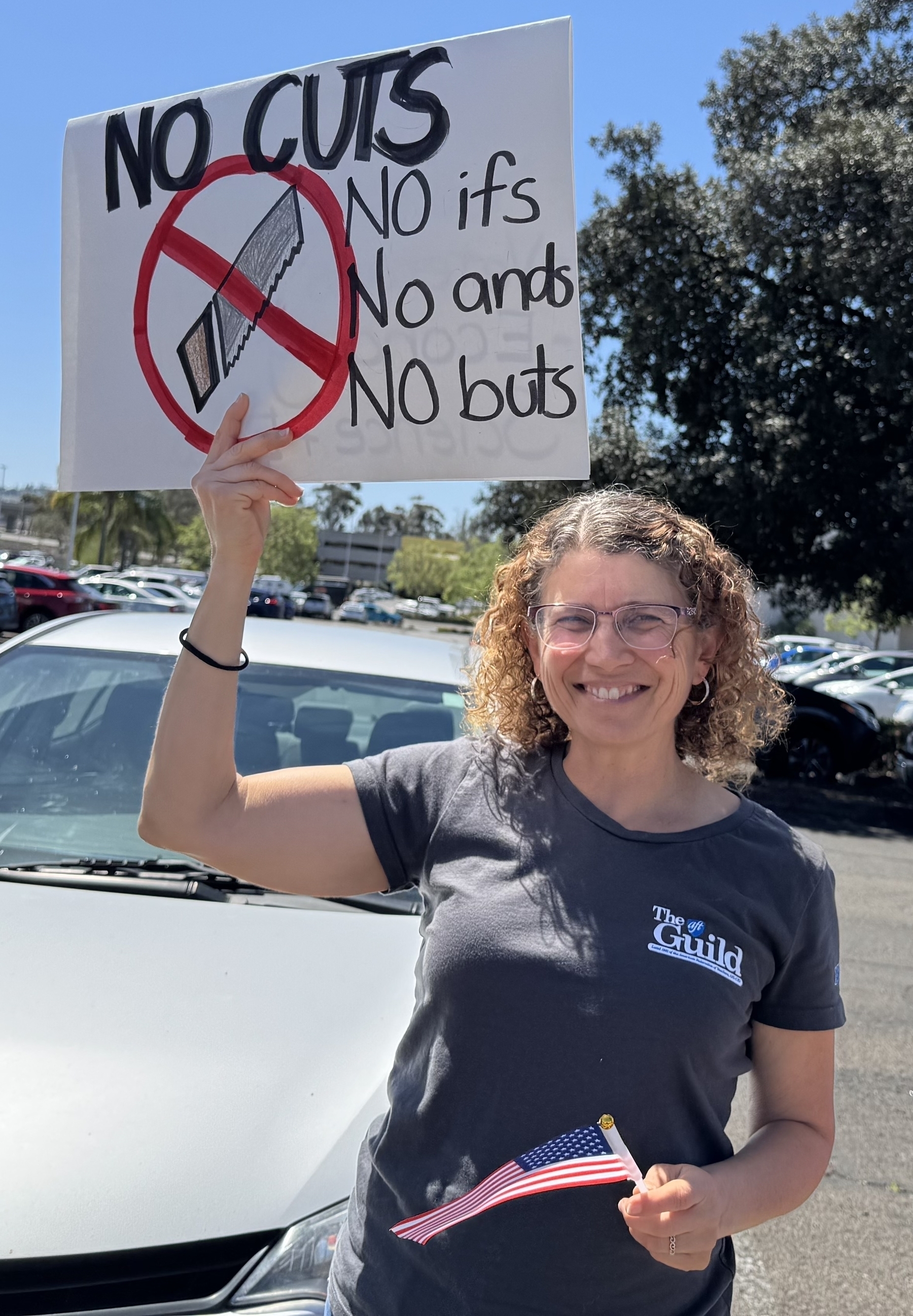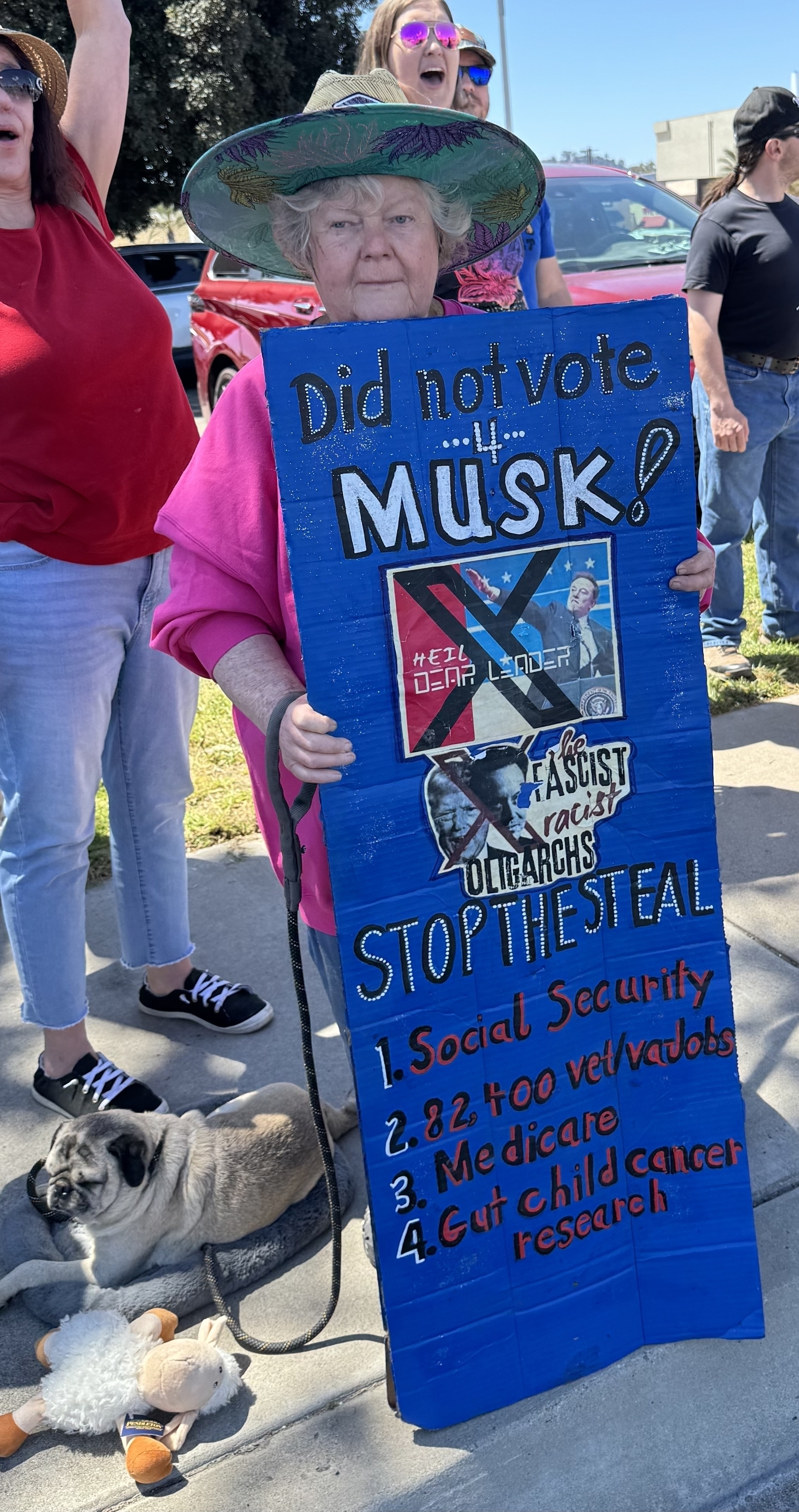I never was a Harry Potter fan but I admired J.K. Rowling enormously. It saddens me to see how her mind has become stunted and hateful
She has herself become like a character in a fantasy novel or comic book: a hero who became a supervillian.
I never was a Harry Potter fan but I admired J.K. Rowling enormously. It saddens me to see how her mind has become stunted and hateful
She has herself become like a character in a fantasy novel or comic book: a hero who became a supervillian.
I now go to an AI chatbot if I have a question, where formerly I’d do a Google search, find a website and look for the answer there. I still use a search engine if I’m looking for a particular website, which I often do.
10 TV character deaths that shocked fans. NYTimes — The death of Colonel Blake on “M*A*S*H” was and is the GOAT. It will never be topped.
But Adriana’s murder on Sopranos was respectable too.
Article author Jennifer Vineyard includes Buffy’s fake death. If I recall correctly, Buffy fake-died twice in the series. But the article fails to include the far greater death on that series: Buffy’s Mom.
This article includes a huge spoiler for a currently airing popular series.
Americans Are Obsessed With Protein and It’s Driving Nutrition Experts Nuts — The Wall Street Journal
Trump and his Republican cronies are already inflicting pain on San Diego County, damaging veterans, education, public health, business, the homeless, migrants and more.
I recently started bookmarking articles chronicling the damage that Trump and his Republican lackeys are doing to us and our neighbors here in the county. Not hypothetical damage, or harm done elsewhere in the U.S. — I was looking for concrete financial, physical and emotional damage that Trump and his Republican supporters are doing here and now.
I had no trouble finding examples. Very soon, I found myself with 50 open tabs, and my browser crashed.
This article compiles all the information I’ve been able to find. It is a looooooooong article. I’ve broken everything up into sections for easier reading. Even as long as this article is, I’m sure I missed a lot.
I originally planned to headline this article “The Trump wrecking ball…. " But this isn’t just about Trump. The entire Republican party is complicit in the damage being done to the U.S. Sadly, that includes your nice Republican city council candidate who comes to all the PTA meetings. The Republican Party has demonstrated universal obedience to Trump. Local Republicans may have been able to resist quietly, for now, in some matters, but if Trump is allowed to continue, local Republicans will soon be brought to heel.















The rally got a few hundred people. There were a dozen events throughout the county and the rally in downtown San Diego reportedly got thousands of participants. Protesters rallied nationwide
I keep forgetting you can buy prints of historical photos from Shorpy.com, unframed or framed. I think I’m going to just forget it again, on purpose.
I rebooted my Mac and the Vivaldi browser deleted about 50 open tabs in a workspace. Argh. I think I’m going to take a little break from Vivaldi for a while. And I wish software was a solid object so I could stomp on it and throw it out the window.
The president of the United States is disappearing people to a Salvadoran prison for terrorists. A prison known by its initials — CECOT. A prison built for disappearance. A prison where there is no education or remediation or recreation, because it is a prison that does not intend to release its inhabitants back out into the world. It is a prison where the only way out, in the words of El Salvador’s so-called justice minister, is a coffin.
On Monday, President Trump said, in the Oval Office, in front of the cameras, sitting next to President Nayib Bukele of El Salvador, that he would like to do this to U.S. citizens, as well.
Klein goes into some detail on the case of Kilmar Armando Abrego Garcia, whom the Trump administration itself admits was mistakenly sent to CECOT. The Trump administration itself admits Garcia is no terrorist or gang member. But they won’t lift a finger to get him back.
If Trump can do this to Garcia, he can do this to anyone. You, me, anyone.
Once Trump’s dictatorship is established there is no way back within the current US system. When his regime finally collapses the models for reform will be those of post-war reconstruction of a defeated and discredited state, a process which is sometimes successful, sometimes not, but always painful.
— Crooked Timber, The point of no return: Only days left to stop a totalitarian state in the US
To say the administration must observe “due process” is to beg the question: what process is due is a function of our resources, the public interest, the status of the accused, the proposed punishment, and so many other factors. To put it in concrete terms, imposing the death penalty on an American citizen requires more legal process than deporting an illegal alien to their country of origin.
I try to only bust out the curses when they’re warranted on this blog, but fuck everything about this. This clown who pretends to be an intellectual argues that due process, which the US Constitution guarantees to all “persons” in the 5th Amendment is more of a suggestion than a mandate.
…
Vance argues that someone facing the death penalty obviously deserves more due process than someone facing deportation. But that misses the point: the purpose of due process is to determine whether the government’s charge is legitimate in the first place, not just to scale the process to the severity of the punishment.
This comes back to the simplest problem in negotiating with Trump: you can’t actually cut a deal, because he’ll always come back for more. American elites are beginning to realize that they can’t conditionally surrender: they can’t give Trump some stuff and expect to be otherwise left alone.
I think the odds of significant elite opposition are high. They don’t want to, but Trump has backed them into a corner.
This comes back to the simplest problem in negotiating with Trump: you can’t actually cut a deal, because he’ll always come back for more. American elites are beginning to realize that they can’t conditionally surrender: they can’t give Trump some stuff and expect to be otherwise left alone.
I think the odds of significant elite opposition are high. They don’t want to, but Trump has backed them into a corner.
And Zuckerberg is seeing that his paying off and sucking up to Trump and the right hasn’t bought Meta any protection. Trump is happy to take your money and sycophancy and then fuck you over anyway.
Juan Carlos Lopez Gomez, a U.S.-born citizen, was detained by ICE as an “unauthorized alien,” despite his mother’s presenting authorities with his birth certificate and Social Security card. Lopez Gomez was born in Georgia.
Hafiz Rashid at The New Republic:
He appears to have been arrested and charged under an “anti-immigration” law passed in Florida two months ago, despite the fact that the law is currently under a temporary restraining order and isn’t supposed to be enforced.
Also: ICE officers literally smashed a car window open to arrest the wrong man
He slept in caves and walked a 365-mile circle over and over for decades.
Sam Anderson at the New York Times:
In summer and in winter, in every possible kind of weather, the man wore, from head to toe, an outrageous outfit he seems to have made himself: rough leather patches stitched together with long leather strips, like a quilt. It was stiff, awkward, stinky and brutally heavy. It looked like knight’s armor made out of baseball gloves. To anyone encountering him on a quiet country lane, he must have seemed almost unreal: a huge slab of brown, twice as wide as a normal man, his suit creaking and squeaking with every step.
…
The 21st century, unfortunately, turns out to be the perfect moment to be obsessed with his story. America keeps spasming, with increasing violence, in many of the same ways it spasmed in the 1800s.
And so Anderson decided to walk the Old Leatherman’s route.
A grim longread by Naomi Klein and Astra Taylor at The Guardian: “The governing ideology of the far right has become a monstrous, supremacist survivalism. Our task is to build a movement strong enough to stop them.”
[Right-wing American oligarchs] have been championing what they call “exit” – the principle that those with means have the right to walk away from the obligations of citizenship, especially taxes and burdensome regulation. Retooling and rebranding the old ambitions and privileges of empires, they dream of splintering governments and carving up the world into hyper-capitalist, democracy-free havens under the sole control of the supremely wealthy, protected by private mercenaries, serviced by AI robots and financed by cryptocurrencies.
These billonaires see the world burning down and they’re not trying to stop it. They’re pouring gasoline on it. The oligarchs “believe “our planet is headed towards a cataclysm and it’s time to make some hard choices about which parts of humanity can be saved.”
How do we break this apocalyptic fever? First, we help each other face the depth of the depravity that has gripped the hard right in all of our countries. To move forward with focus, we must first understand this simple fact: we are up against an ideology that has given up not only on the premise and promise of liberal democracy but on the livability of our shared world – on its beauty, on its people, on our children, on other species. The forces we are up against have made peace with mass death. They are treasonous to this world and its human and non-human inhabitants.==
Second, we counter their apocalyptic narratives with a far better story about how to survive the hard times ahead without leaving anyone behind. A story capable of draining end times fascism of its gothic power and galvanizing a movement ready to put it all on the line for our collective survival. A story not of end times, but of better times; not of separation and supremacy, but of interdependence and belonging; not of escaping, but staying put and staying faithful to the troubled earthly reality in which we are enmeshed and bound.
Ben Werdmuller prescribes building value-added services on top of the AT protocol while encouraging others to do the same. This is a similar business model to GitHub.
“Perhaps ironically, this vision comes closer to building an “everything app” than will ever be possible in a closed ecosystem. That’s been Elon Musk’s longtime goal for X, but Bluesky’s approach, in my opinion, is far more likely to succeed. It’s not an approach that aims to build it all themselves; it’s a truly open social web that we can all build collaboratively.”
Werdmuller also plans to lay out some prescriptions for Mastodon, and I am looking forward to reading those.
I get that Mastodon is, at least for now, open while BlueSky is, for now, as much a silo as Facebook or Twitter. But BlueSky is where the energy is, and I’d like to see it thrive and open up.
I’d also like to see the walls come down between Mastodon, BlueSky and the web. Because for now it looks like we’re rebuilding the silos of Web 2.0, but doing it with open source. Open source doesn’t matter if everything is still siloed, which it now is. And it’s painful to see Mastodon users scoff at BlueSky and BlueSky users dismiss Mastodon. We’re all on the same team here.
I’d also like to see both Mastodon and BlueSky support long posts, but I get that might be antithetical to their cultures.
If one’s name is a brand, then mine is tarnished.
—Elon Green at The New York Times
Like Green, I am a man with a relatively uncommon first name. I share that name with the recent Republican Speaker of the House. I am active in the local Democratic Club, and one of the women on the board is a sweetheart who gets quite exercised over Republican abuses. She has a thunderous voice and swears blisteringly when she’s worked up. At meetings, I’d hear her shout, “FUCKING MITCH!” and I’d flinch. “What?! What did I do?!”
When Julie and I are both out of town we board the dog at a place called Camp Bow Wow. They give us a report card for the dog and sign their emails “Furry regards.” At first, that seemed painfully twee, but who am I kidding? Do I think I’m some gangsta? I love the report cards and the furry regards.
Documentary Claims Jim Morrison Is Alive, Living in Syracuse. Break on through, Jim.
Those seven precious hours of sleep suddenly break in two. There is, if one is lucky, the “first sweet sleep of night” and the last deep sleep of morning, but between the two appears a sinister, ever widening interval."
That’s me. Or was, until I started taking Trazadone a few months ago. It’s an amazing miracle drug.
My insomnia almost always follows the same pattern: I don’t have any trouble getting to sleep at first. I fall asleep, deep and sweet, for a couple of hours, and then I get up to pee and can’t get back to sleep. I lay in bed a little while, trying various mind tricks and torturing myself with anxiety and self-loathing. Sometimes that lasts for hours, until morning. Sometimes I get up for a couple of hours, which reduces the anxiety and self-loathing but it’s not sleeping. Sometimes I can get back to sleep before the alarm goes off, but it’s not enough sleep and I stagger through the rest of the day. Sometimes I just sit there until it’s time to wash up and start the day.
I used to get insomnia attacks like that a few times a week. Now, it’s down to a couple of times a month, thanks to Trazadone.
Over a 50-year-career, Villanch worked on campy variety shows that live forever on YouTube, including the Brady Bunch Variety Hour and the Star Wars Holiday Special. They are the subject of his new book, “It Seemed Like A Bad Idea At The Time: The Worst TV Shows in History and Other Things I Wrote.”
Villanch is best known as a regular guest on Hollywood Squares, and he was head writer at the Academy Awards for 15 years. “It’s the kind of entertainment he writes for where he really excels: star-studded variety shows with big, brassy musical numbers.”
You’ll remember Villanch if you’ve seen him on TV: He’s a big, fat gay man with a blonde Prince Valiant haircut, who wears novelty T-shirts and chunky eyeglasses with frames in bright primary colors. He has a big deep voice and a sharp, fast wit.
Anytime Villanch is on an interview podcast, I’ll listen that podcast. He’s full of great old showbiz stories.
When I was a kid in the late 60s and very early 70s, there were a lot of toys that looked cool but they only did one thing and that one thing ceased to be entertaining in a few minutes.
After much nagging, my parents got us a remote-controlled toy flatbed semi-truck. The remote control operated with a wire about three feet long, and the truck was about two feet long.
You could drive the truck around the playroom a little bit. It crept along on its little wheels.
And that was it. Entertainment value for about five minutes.
Same for a toy plastic hovercraft, about a foot long, oval-shaped. You held a little motor in your hand, and the motor was attached to a long, thin hose, like the clear plastic hoses you found in a fishtank. The motor operated a fan that blew air through the hose and caused the lightweight plastic toy hovercraft to float.
You couldn’t steer the hovercraft. You could drag it around on the floor for a bit. Then what? Entertainment value: About five minutes.
It’s a cliche, but it’s true: The best toys are simple and open-ended. Blocks. Big cardboard boxes — the kind that a washing machine ships in. Snow that can make into a fort or castle.
I remember when I was about 11 years old, sitting on the floor in the playroom and building vast brutalist palaces out of Lego bricks. It was a meditative activity. You have a lot to think about when you’re 11 years old.
I host my blog on Micro.blog. It is in many ways a lovely service but I do not recommend it to others because tech support is lackadaisical. I’m low-key keeping my eyes open for alternatives, but there aren’t many and the ones that exist seem to be susceptible to the same problems as Micro.blog.
Elephants at the San Diego Zoo form an “alert circle” to protect a young elephant and each other during yesterday’s 5.2-magnitude earthquake — YouTube
The group stayed tightly together for about four minutes. A zoo spokesperson said the behavior is called an “alert circle” and said it is “intended to protect the young — and the entire herd — from threats.”
Charles Dickens was an inveterate walker, going for hours every day at a brisk pace, usually alone. “He did so because walking time was thinking time, or perhaps more accurately dreaming time.,” writes Luke McKernan.
Dickens walked in the day and in the night. He once got up at two in the morning and walked 30 miles to breakfast.
Today, McKernan lives in “the heart of Dickens territory,” Rochester and the Medway towns in England.
The high street businesses alone bear witness to the Dickensian connection: they include Tiny Tim’s Tearooms, Fezziwig’s, Mr Tope’s, Ebenezer’s, Pips of Rochester, Sweet Expectations, and the inspired A Taste of Two Cities. In days past we have had Hard Times the antique shop, and – believe it or not – the Havisham Wedding Centre, which perhaps not surprisingly went out of business.
Richard Kind Is Glad He’s Not That Famous — Fresh Air. An interview with a brilliant comic character actor whose face and voice you recognize even if you don’t know his name. He is a treasure.
“So the president of the United States proposes, on camera, to deport Americans to foreign concentration camps.” — Timothy Snyder
Unions need to be ready to strike. It’s the source of their power. “When radical things happen, only fools do not become more radical.” — Hamilton Nolan
The unbearable lightness of Korean cute — Chris Arnade walkingtheworld.substack.com
“ICE is making arrests wearing masks, not showing ID and grabbing people off the street into unmarked vans. Straight up Gestapo shit…. I can’t even count the number of actions Trump has taken which should lead to impeachment.” ianwelsh.net
Blue Cross of Louisiana doesn’t give a shit about breast cancer: The insurer pocketed hundreds of millions of dollars in payments for breast reconstructive procedures that it previously approved, on the Orwellian rationale that just because they approved it doesn’t mean they agreed to pay it. pluralistic.net

We just had an earthquake. 5.2 magnitude about 32 miles from here (near Julian). Bigger and longer than any I’ve personally experienced. No damage or injury in and around our house.
ME DURING AN EARTHQUAKE: “Um, I think we’re supposed to go outside? I’ll just get my coffee first.”
Cory Doctorow: Instead of retaliatory tariffs, US trade partners should repeal anti-circumvention laws that protect US tech monopolies. “Indeed, repealing anticircumvention is a frontal assault on the firms whose CEOs ringed Trump on the inauguration dais.” jacobin.com
Musk gets his political philosophy from a 100-year-old antisemitic and racist movement called Technocracy, which advocated replacing governments with engineers and scientists. Musk’s grandfather was a leading Technocrat who moved to South Africa because he thought apartheid was grand. nytimes.com
Elections Aren’t About Compromise— They’re About Power… Let the Consultants Burn: Democrats' fear of identity politics and wokeness convinces nonwhite voters that Democrats don’t care about them and that’s how Democrats lose. downwithtyranny.com
Crossing the U.S. Border? Here’s How to Protect Yourself theintercept.com/2025/03/2…
Gen Z is flocking to Tumblr. businessinsider.com. I’ve been on Tumblr since 2009 and I’m still active today. That makes me either “forever young” or “a creepy old guy.” I’m going to go with “creepy old guy.”
The original Star Wars is back – but what if George Lucas is right about it not being much good? Lucas said the original 1977 version was half a movie and preferred the 1997 digital remaster. theguardian.com
I was 16 when I saw “Star Wars” in 1977 in the theaters. It blew me away.
RIP Jean Marsh, who created and starred in “Upstairs, Downstairs.” She was born into the working class. “If you were very working class in those days, you weren’t going to think of a career in science,” she said in 1972. “You either did a tap dance or you worked in Woolworth’s.” nytimes.com
Life advice from octogenarian Roger Rosenblatt at the New York Times:
2. Make young friends.
For older folks, there is nothing more energizing than the company of the young. They’re bright, enthusiastic, informative and brimming with life, and they do not know when you’re telling them lies.
Also:
6. Everyone’s in pain.
If you didn’t know that before, you know it now. People you meet casually, those you’ve known all your life, the ones you’ll never see – everyone’s in pain. If you need an excuse for being kind, start with that.
A lovely, wise and funny essay.
Do me a favor please: If you’re reading this on Mastodon, please reply. Late Friday afternoon, I migrated my Mastodon account (which is, or was, @mitchw@mastodon.social) to my MIcro.blog blog (@MitchW@mitchw.blog).
But I’m not sure if it worked.
So please let me know if you see this message on Mastodon, and also please let me know if you recall whether you followed me on @mitchw@mastodon.social or @MitchW@mitchw.blog.
Thanks!
Bluesky’s Quest to Build Nontoxic Social Media. newyorker.com. Kyle Chayka writes an in-depth profile of Bluesky CEO Jay Graeber.
“I’m Not a ‘Gatsby’ Scholar. I’m a ‘Gatsby’ Weirdo.” Andrew Clark has listened to “The Great Gatsby,” read by Jake Gyllenhaal, more than 200 times since 2020. This is a lovely short essay about a lot more than one man’s obsession with a single book. nytimes.com
I think I’ll sign up for the Pro subscription for ChatGPT again. I’m intrigued by the new persistent memory feature.
The Week ChatGPT Truly Became an Assistant. parkerortolani.blog
A roomba that continuously says “polish polish” would get annoying quickly.
James Lundberg, writing at The Atlantic, describes how the new technology of photography changed people’s perceptions of themselves and their faces.
When Abraham Lincoln was running for President in 1860, a little girl wrote him a letter advising him to grow a beard to improve his appearance. And so he did.
“If you will let your whiskers grow,” she wrote, “you would look a great deal better for your face is so thin.”
I think this story is familiar to most Americans, taught in schools. What I did not realize until reading this article is that Lincoln’s looks were an issue because photography was new — it first came to the US 21 years earlier. Photo studios quickly swept the country and set off a fad for portraiture.
Those having their likeness taken for the first time did so with some combination of wonder and trepidation. Posing before the camera, early sitters said they felt drafts of air on their face or tingling in their cheeks. The process was orchestrated by a camera operator under a blanket–whom [Oliver Wendell Holmes, writing in The Atlantic in 1859] described as a chemical-wielding “skeleton shape, of about a man’s height, its head covered with a black veil.” The experience seemed to partake of the occult. And the results, often ghostly because of the long exposure times required, only strengthened such feelings.
These early sitters weren’t entirely wrong. There was no sorcery involved, but something was happening to them in front of the camera. Becoming an image, reckoning with an entirely new form of self-presentation, introduced an intense awareness not just of the self, but of the face.
Parallels to the later invention of television and smartphones are apparent.
RIP George Bell, 67, who stood 7'8" and was listed by Guinness as the tallest man in America. “I never had anyone else around who was 7-8 who I could talk to and who could help me learn how to handle it,” he said. “Fortunately for me, I’m a very patient person.” nytimes.com
A Rhode Island state legislator suggests getting around the Trump tariffs using a 1663 “royal charter” to declare the state a “free trade zone.” Sure, why not? abc6.com
Zuckerberg in the dock: The antitrust case against Meta is strong and the Trump White House seems inclined to pursue it aggressively. [pluralistic.net]
“You have only two choices if Trump comes after you: 1. If Domestic, fight. 2. If foreign, and he’s only threatening, tell him to pound sand and ignore him. If he does something, retaliate.” [ianwelsh.net]
Welsh is talking about strategy, not ethics. Obedience doesn’t work with Trump, who sees compliance as weakness and comes back for more.
“Apparently, people don’t want the US dollar to be a meme stock.” Also: “Far-right populist parties get into power by raging against the incumbents and the establishment and then once they’re in office, they have to continue to pretend like they aren’t actually in power.” [garbageday.email]
Scientists dispute Colossal Biosciences’ claims to have brought the dire wolf back from extinction. “… extinction is still forever.”
I’m still traumatized from the season finale of “The Pitt.”
I want to see one feature in the iPhone and iPad: support for a clipboard manager that runs in the background. I don’t care about Siri, thinner devices, foldable phones, improved battery life or other rumored advances. Just give me a clipboard manager that runs in the background.
It’s the photo that ends the movie, of Jack Nicholson in period costume composited into a photo of dozens of formally-dressed 1920s partygoers.
After decades of mystery, the original image — sans Jack Nicholson — has finally resurfaced in a photo archive after 45 years…. no one kept a record of where, what, and who was in the original photo. Following an investigation by retired British academic Alasdair Spark and New York Times journalist Aric Toler, it has been revealed the original photo was taken by the now defunct Topical Press Agency at a St. Valentine’s Day Ball in the Royal Palace Hotel, London, on February 14, 1921.
Trump White House budget proposal eviscerates science funding at NASA. “This would decimate American leadership in space.”
Massive cuts to NASA science are proposed in an early White House budget plan. “This is an extinction-level event for NASA science.”
Trump Is Stupid, Erratic and Weak (Paul Krugman)
Aussies miss when morning routine didn’t involve finding out whatever the fuck this cunt did today (John Delmenico / The Chaser)
Trump’s Psychological Vulnerability (Timothy Snyder) — “Donald Trump thinks that everyone is always ripping him off.” Trump has no conception of doing business fairly or of a deal where both sides are happy.
The Sick Psychology Behind Trump’s Tariff Chaos (Timothy Noah / The New Republic) — “Caregivers with [Munchausen’s syndrome by proxy] don’t poison their children once and then restore them to health. They do it over and over, because the cycle from sickness to health brings them pleasure.”
Nothing in your workflow is permanent (Matt Birchler)
The New York Times Ethicist blesses pirating e-books if you’ve already bought the hardcover. (Randy Cohen — thanks, Cory!)
Trump has shown himself to be a partner who can’t be trusted — he’s unreliable and routinely goes back on his word. But Western nations hate China enough that Trump might pull this off, Welsh says.
If so, we’ll be the weaker side, as the USSR/Warsaw Pact was last time and we will lose the new Cold war, falling further and further behind technologically and watching as the Chinese enjoy goods we can barely even dream of, just as was true of the late Soviet Union.
Everything, and I mean everything, will be sacrificed to keep the oligarchs in power, keep making them richer and keep the flow of unearned cash pouring into every rich person’s orifices.
On the other hand, the EU and China are in talks to end EU tariffs on electric vehicles. “That sound you hear is Elon Musk puckering up to kiss his ass goodbye.”
“Paper is good. Somehow, a blank page and a pen makes the universe open up before you." (Dynomight) — All my writing, note-taking and task lists go into my computer or phone. I love the idea of writing on paper, but I do not do it. For me, this article is aspirational.
Tariffs, integrity, and chaos (Matt Birchler)
What do we think of Google Gemini? How does it compare with ChatGPT, Perplexity and Claude?
I have two superpowers: finding the right-sized Tupperware container for leftovers and moving things around in the refrigerator until there is room for something else when the refrigerator looks full.
Adobe Got Bullied Off Of Bluesky (Ryan Broderick / Garbage Day (seventh item — scroll down) — “… this is becoming a genuine issue for Bluesky…. It’s really easy to be the cool, new anti-corporate social network up until the point where you actually need to make money.”
I’m Not An Economist, But I Don’t Think This Tariff Thing Is Working, Guys (Ryan Broderick / Garbage Day)
I found this to be a fascinating story: “Digital humans” — realistic, AI-powered avatars — are poised to revolutionize human-computer interactions in the telecom sector. These avatars provide higher customer satisfaction and increased likelihood of purchases compared with traditional interfaces, according to research. Companies such as AT&T, Amdocs and ServiceNow are leveraging AI to automate network operations and enhance customer service.
Here’s something I saw while walking the dog.


Walking the dog this morning down a residential street, a white-haired older woman pulled up in a car next to me and rolled down her window and shouted something. I could not hear what she said, so I went a little closer and asked her to repeat it.
She said, “God loves you and your baby.”
I have had people shout worse things to me from rolled-down car windows.
Today I learned if you soak your TiVo remote in salad dressing it don’t work good after.
We saw “A Complete Unknown” tonight. It paints a portrait of Dylan as a magnificently talented and charismatic asshole.
Trip Gabriel / The New York Times
I did not read Keen‘s book. I had not even heard of it or him until I read this obituary. I did, however, read “Iron John,” by Robert Bly, which was published about the same time and was another touchstone of the men’s movement of the 90s.
I think there are many, many ways of being a man and I am not the type of man that the men’s movement of the 90s spoke to. And if the “manosphere” of the 2020s is anything like how I’ve seen it described, I certainly don’t want to be involved in that.
Xochitl Gonzalez at The Atlantic:
… these were students in America doing what students in America should do: questioning authority (in this case, me) and using their rights to free speech and free assembly to engage with issues they are passionate about.
Also, Rümeysa Öztürk, a Tufts University grad student, was surrounded by “hooded and masked plainclothes [ICE] officers” near her Somerville, Mass., home. She was “seized in the street, handcuffed like a criminal, and put inside the back of an unmarked car in what looked, to passersby, like “a kidnapping.”
She is a Turkish citizen legally in the U.S. who did nothing other than write a civil editorial urging her university to “take more seriously a vote from the student senate calling on the university to divest from Israel.” She broke no law.
Marco Rubio’s interpretation of law to justify Öztürk’s arrest is “just one more example of the Trump administration’s attempts to change America from a nation of rights to a nation of privileges that can at any moment be revoked.”
The good trouble checklist: keep all your shenanigans in one place (Rabbi Danya Ruttenberg / Life Is a Sacred Text) and Some actions that are not protesting or voting..
Walking Xi’an (China) (Chris Arnade Walks the World) “A human city of inhuman scale.”
It’s scary to be an American right now as Donald Trump and Elon Musk run amok in Washington. But we here in San Diego can be a little less scared than our friends and family elsewhere in the country because we live in a Blue county in a powerful Blue state.
But San Diego could become scarier if the Republican candidate wins the April special election to fill a vacant seat on the San Diego Board of Supervisors. If the Republican candidate wins that seat, the Republican Party will control the county board of supervisors, bringing a MAGA regime to San Diego. To prevent this, we must do two things: 1) Turn out the Democratic vote, and 2) vote only for Imperial Beach Mayor Paloma Aguirre, the endorsed candidate of the San Diego Democratic Party, despite more than one Democrat being running in the election. Otherwise, we split our vote and risk a Republican taking the seat in the Primary. If that happens, we will have a MAGA County Board of Supervisors.
If you live in District 1, please vote for Aguirre. And if you don’t live in District 1, please talk to friends and family there and encourage them to vote for Aguirre.
Act fast — the election ends Tuesday, April 8, in five days!
The county board of supervisors has a broad scope of authority: It manages a significant budget for services and programs, disperses federal funds, manages social welfare programs such as CalFresh, Medi-Cal and the foster care system, and it oversees local government and law enforcement for unincorporated areas of the county.
Aguirre will make a great supervisor. As mayor of Imperial Beach, she has an impressive array of accomplishments. She has been a champion in the fight to clean up the South County sewage crisis, securing $600 million in federal funding. She has helped make life more affordable by lowering utility rates and adding moderately priced homes. She achieved gains in public safety and disaster response, fighting homelessness, and overall quality of life for all San Diegans — not just the rich. And, of course, she has worked to protect our values — Aguirre is pro-choice; she favors keeping local law enforcement focused on fighting crime, not doing the federal government’s job on immigration enforcement; and she opposes federal cuts to Medicare, Medicaid, elder care and Social Security.
There are other excellent Democrats in this race. But Aguirre is the San Diego Democratic Party’s endorsed candidate, and we all must get behind one candidate to help her achieve more than 50% of the votes in this special election.
If the Republicans win the board, we can expect to see cuts to social services, including homeless aid and mental health benefits. Republicans will enact economic policies that help the rich and hurt the middle class and poor.
We’re already seeing Republicans doing damage in San Diego. As County Supervisor Terra Lawson-Remer points out in a recent newsletter, extreme federal service reductions aren’t a distant Washington fight; they will directly impact all of us in San Diego, cutting healthcare, housing, and homelessness benefits and increasing the cost of living.
“Slashes to healthcare?” Lawson Remer writes. “It means bigger crowds and longer waits the next time you’re in the emergency room.”
She adds, “Elimination of federally funded housing vouchers? It means local homelessness will increase as more of our neighbors won’t be able to make rent in high-cost San Diego.
“Cuts to Medicaid? It means fewer beds in the County for unhoused people having a mental health or substance abuse crisis on the streets.
“Reductions in the national food assistance program known as SNAP? It means kids in our community who we see every day — children of our friends, neighbors and coworkers — will have less to eat.”
50,000 people could lose access to job training and financial assistance, 400,000 San Diegans may no longer receive food assistance, and nearly 900,000 residents could lose Medi-Cal healthcare coverage, Lawson-Remer writes.
A Republican majority on the San Diego Board of Supervisors would make the damage we’re seeing from Republican policies much worse.
In contrast, Aguirre will help make the county better for everyone, not just the rich. It’s that simple. We need to restore the Democratic majority to the board. If you live in District 1, please get out and vote for Paloma Aguirre. And if you live outside the district, get your friends and family in District 1 to vote for the endorsed Democratic candidate, Paloma Aguirre.
The district includes Chula Vista, Imperial Beach, National City, and some communities in the City of San Diego, including Barrio Logan, East Village and Golden Hill. It also includes the unincorporated areas of Bonita, East Otay Mesa, Lincoln Acres, Sunnyside and La Presa.
Eligible District 1 voters have already received ballots in the mail; they must be returned no later than Tuesday, April 8. You can mail the ballot in through April 8, drop the ballot in one of 29 official ballot boxes throughout the district, or vote in person starting Saturday, March 29. Find locations of drop-off boxes, in-person voting locations, and more information on SanDiego.gov and more background on the election on the KPBS Voter Hub.
A version of this article appeared in the April edition of the Progressive Voice, the newsletter for the La Mesa-Foothills Democratic Club. I’m a board member at large for the club.
The new version adds integration for generative AI, improved text editors, and more.
I’ve been using DT 4 in beta for a couple of months and found it to be stable and excellent.
The GenAI integration will no doubt get all the attention, but honestly, my favorite new features are the improvements to the Markdown editor, including customizable margin widths, typewriter scrolling and WYSIWIG editing.
Many people use DevonThink in conjunction with something else for note-taking and writing, such as Obsidian or Ulysses. I use DevonThink for all three — document management, note-taking and writing — though I also other apps for specific jobs, such as Apple Notes for notes and documents I need fast access to on mobile (such as travel itineraries) and Drafts as a scratchpad for jotting down quick thoughts.
Apparently the plaid frog article I linked to yesterday was an April Fool.
I fucking hate April Fool. I hate all practical jokes. Yes, I am a fool for thinking you were someone I could trust. Don’t worry — I won’t make that mistake again.
Matt Stoller: America has a ‘number go up’ strategy for Wall Street, and that means we can’t build.. Our top national priority is keeping stock prices rising and that’s why we don’t build anything. It’s Agatha financialization all along.
My doctor thinks going for tests is a hobby for me. My dude, I am not going to a cardiologist or pulmonologist for baseline tests, if there is no indication of anything wrong. I have other things to do.
The greatest line in movie history.. Val Kilmer as Doc Holliday in “Tombstone.”
This article, by Diana Budds at the NYTimes, features the restaurant on top of the Marriott Marquis on Times Square. The restaurant recently reopened after closing in 2020.
I ate there a few times in the early 90s; it was nice. The rotation is so slow as to be imperceptible, though (as the article notes) if you went to the bathroom, which was in the non-rotating hub of the restaurant, it was easy to get confused to find your way back to your table. Especially if you had a few drinks.
There were a pair of concentric pony-walls on the perimeter of the dining areas, the inside one rotating, the outside one not rotating. Tables butted up against the inside pony-wall, and it was very easy to mistakenly put your cigarettes, lighter and drink down on the outside pony-wall and wonder a few minutes where the hell they’d gone to and you’d have to wait a half-hour for them to come around again on the turntable, by which time your cigarette had burned down the ice in the drinks had melted.
The Marriott Marquis also had a rotating lounge inside the lobby. A waitress told me the sections of the lounge were color-coded so they could find customer tables.
Even in the 90s, the design of the place seemed old-fashioned — so much orange! — but of course I loved that.
Scientists discovered a plaid frog in the Suriname rain forest. (Moss and Fog) — “I thought it was a scrap of flannel,” said Dr. Elise van Drohm, lead researcher on the expedition. “Then it blinked and leapt like a tiny, toxic fashion statement.” Follow the link for gorgeous frog photos.
RIP Val Kilmer. He played many roles, but I’ve long known and loved him as Doc Holliday in “Tombstone.”
Two wins for democracy today. Cory Booker in the Senate and Susan Crawford in Wisconsin.
I’m fighting a solo war to preserve the use of “invitation” as a noun.
Trump’s Negotiating Is Failing.
Welsh says Trump is “picking too many fights all once, his tariff threats are incoherent and unplanned, he’s defunding research and forcing brilliant scientists and engineers and scholars out of the US, has no industrial policy worth speaking of and is destroying America’s governing capacity with capricious cuts to the federal bureaucracy.”
Perhaps most damaging of all, Trump is giving every other nation of the world “reason to route around America like it’s damage: to stop using the US dollar, to move to using local currencies for trade and to stop buying American goods and services, and yes, to stop selling to the US.”
Soon, Welsh says, other nations will stop enforcing American intellectual property law, which will sabotage the US tech sector. (Cory Doctorow advocates for this.)
My $0.02: But what about companies like Nvidia, Apple, Google, Microsoft, Amazon, etc.! Companies like that are powerful engines of growth and will keep America strong!
Oh, yeah? Why would they want to stay in the US?
Crossing the U.S. Border? Here’s How to Protect Yourself (Nikita Mazurov, Matt Sledge / The Intercept)
What Is It Like Living With Long COVID? (Nicole Pajer / AARP) — Thanks, Julie!
For a long time, I’ve thought that we Jews did not believe in an afterlife — that we believed we should live well and do what’s right for its own sake, not for the sake of entering heaven after we die.
Turns out that this is just one of a multitude of afterlife beliefs in Jewish tradition — many Jews believe in reincarnation, many believe in resurrection on Judgment day and some even believe our souls are transported to Jerusalem through a network of subterranean tunnels while being beaten to a pulp by demons (which sounds like no fun at all).
I’m sticking with “do right because it’s the right thing to do.” I like the sound of that. If we are rewarded in an afterlife, that’s a bonus. But I think that when our brains stop it’s lights out.
I read very few books in the late 2010s, while consuming massive quantities of articles and posts. That bothered me. A few years ago, I learned that book-reading is a skill, different from reading articles and certainly very different from reading social media posts. I retaught that skill to myself. Now I’m up to about a dozen books a year and I can live with that.
I generally read two books at once. I like to do one fiction and one non-fiction.
When I was a teen-ager, I read five books a week. I had more free time then.